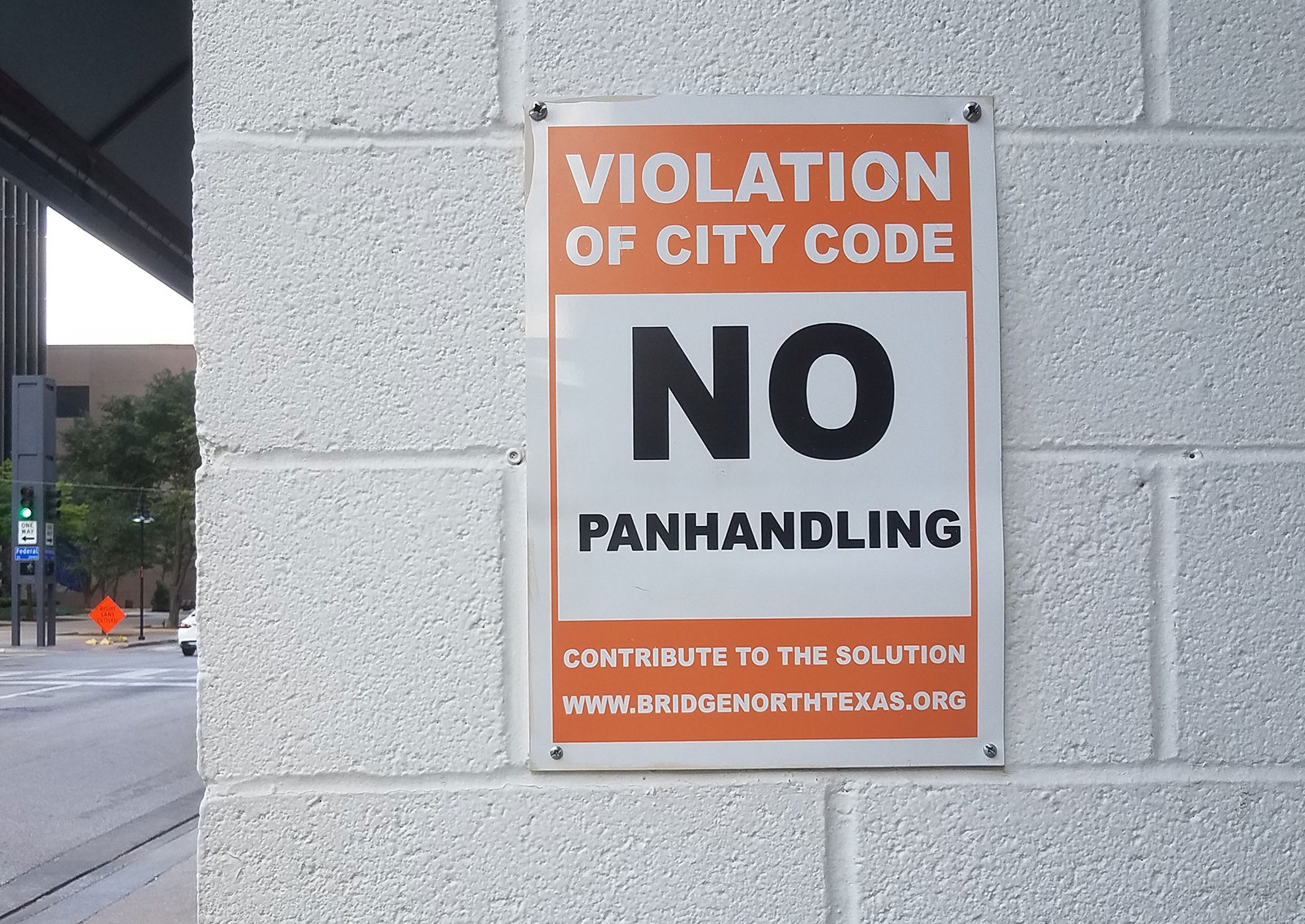Alton Waggoner says he doesn’t want to ask strangers for money. It’s one of the first things he shared as we ate breakfast one morning last month. But after some admittedly bad decisions and a series of misfortunes, the 68-year-old veteran finds himself frequently doing so. He’s now one of four plaintiffs suing the city of Dallas over an ordinance that criminalizes standing in an intersection median.
“It’s just hard, you know, to go to some place and ask them for money,” he said. “I’m like a lot of people—COVID came, and I was working at an assembly plant. They let me go. I lost my apartment, I lost my car.”
The ordinance was originally presented as a way to curb panhandling, but as the vote approached last fall, the discussion veered toward public safety. That’s the city’s argument against the suit, too—that the ordinance, which allows officers to issue a $500 fine to people standing in the median, is part of its Vision Zero plan to reduce traffic fatalities.
But the suit, which was filed on behalf of plaintiffs Waggoner, Teri Heishman, Hannah Lebovits, and Kawana Scott, alleges that the ordinance criminalizes homelessness. Cities can’t ban panhandling outright because of a Supreme Court ruling that declared the act protected speech under the First Amendment. The suit also points to three similar ordinances that were struck down by courts in other states, including in Oklahoma.
An injunction has also been filed to prevent the city from writing more tickets until the suit is settled, but the court has not yet ruled on an injunction. “They can continue to write tickets as long as the injunction isn’t in place,” said Texas Civil Rights Project attorney Travis Fine, who explained that the “law itself isn’t very clear” about several things. “There’s still this open question of if you’re on the edge of a big median, are you in a clear zone? There are some real, immediate threats to our clients.”
You need money to get something to eat. So I went out and got a piece of cardboard and borrowed a pen, and wrote a sign. It’s like a lot of things in life, the first time you do it, it’s really hard, but after that, it’s easy.
Alton Waggoner
While tucking into pancakes, Waggoner said he didn’t immediately begin asking for money once he became unhoused a year ago. But that is now how he makes his living while trying to address events that are making it difficult for him to work.
“That’s my livelihood,” he said. “It’s something I have to do right now—and hopefully that won’t be forever.”
During breakfast, Waggoner repeated several times that he would love to work, and didn’t anticipate needing others to afford food and the occasional roof over his head.
“I like to say I’m addicted to hotel rooms now,” he said, adding that he started panhandling after noticing others making enough to pay for meals. “You need money to get something to eat. So I went out and got a piece of cardboard and borrowed a pen, and wrote a sign. It’s like a lot of things in life, the first time you do it, it’s really hard, but after that, it’s easy.
“I don’t push it. I don’t ask, ‘Hey, can you help me?’ I just walk by. You want to help me, help me, and I very much appreciate it.”
Waggoner said that he’s never felt safe in shelters—”there’s more crazy people” —but that if he can replace his missing ID, he would like to go to Fort Worth and enter a first-stop re-entry program.
“They’ll help me get a job, and there’s another place that’s going to help me get an apartment or some kind of housing,” he said. “All I have to do is have an ID, and they will give me a job. They’ve already told me, ‘You know, we got you a job.’”
But that ID is the sticking point. He says his was stolen months ago. He also has an outstanding ticket for panhandling in Far North Dallas that he can’t afford to pay, which he says is preventing him from replacing it.
He says he has also been waiting for his Social Security benefits to be reinstated for more than a year. “They got turned off because I was in jail,” Waggoner said, and they should have re-started when he got out. He didn’t want to share why he was in jail, other than he “did some stupid stuff.” (A criminal record search shows no violent offenses.)
“I’m an addict,” he said. “And I went through an adult rehabilitation program with the Salvation Army and they were awesome. But when you finish the program, you’re pretty much on your own.”
Since he began soliciting donations a few months ago, Waggoner says he has also seen a lot of good in the people he interacts with. “The people here are awesome—without them I’d be up a creek,” he said. “Last week I was walking and it was kind of cold, and this man walks up and says, ‘Do you have a thermal?’ and I said, ‘No, I’m all right,’ and he took his shirt off right then and there and gave it to me.”
“You don’t make all that much money,” he said. “I’ve heard people say you make $275 a day—I don’t know where you heard that from, but you tell me where that’s at so I can go there.”
They say that they don’t hassle us, but I’ve got a ticket, and that’s why I can’t get my ID, and why I can’t get a job.
Being cited for panhandling, or being stopped by police and forced to move, means that Waggoner doesn’t eat that day. And adding the possibility of a ticket only makes it more difficult for him and others like him. “It’s like banks taking money out for overdrafts,” he said. “They know you don’t have it, but they take it out anyway. They say that they don’t hassle us, but I’ve got a ticket, and that’s why I can’t get my ID, and why I can’t get a job.”
Waggoner says that many of the people he’s encountered in the same situation are also dealing with a safety net that has failed them. Without better access to services, they’re forced to seek assistance on their own. Most of all, Waggoner said he wished people saw him as a human when they see him standing with his sign.
“Just because I’m homeless doesn’t mean I’m something you need to wipe off your shoes. I’m a human being, and I feel like I’m a good person,” he said. “All I want is to get my driver’s license and my Social Security started. I’m just a regular guy, and I’d like to work if I could. That’s all.”
With his pancakes and coffee finished, Waggoner noticed that another unhoused person he works with was motioning to him from their “spot.”
“It looks like it’s my turn to work for a while,” he said, shouldering his backpack and heading out to the cold intersection. “See you soon.”
Author






